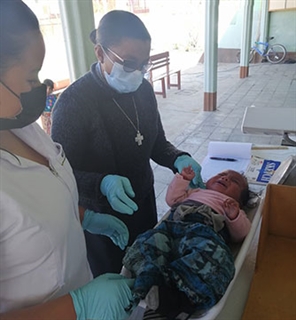You’ve taken the first step in supporting the Greatest Needs of the School Sisters of St. Francis’s Worldwide Mission, so please keep Movin’ 4 Missions by inviting your family, friends, co-workers, and neighbors to sponsor your efforts!
Some of our most pressing needs include:
 Asha Bhavan, Carmelaram, India
Asha Bhavan, Carmelaram, India
The 24 elderly and abandoned women who live at Asha Bhavan (House of Hope) in Carmelaram need constant medical care to survive. Many of the women are bedridden, mentally challenged, or extremely fragile in mind and spirit after having been abandoned by their families. Our sisters provide that care 24 hours a day, seven days a week. The facility also provides special nursing, medicine, and loving, compassionate care while treating each woman with dignity.
Goreghat Mission, Jabalpur, India
On an average day, more than 50 patients visit the dispensary of Goreghat Mission in Jabalpur, Madhya Prahesh, to receive free medicine and medical care. The patients treated at the clinic, which is staffed by one of our sisters, are extremely poor tribal people who have no access to hospitals or funds to seek treatment elsewhere. To meet the needs of so many patients, the mission needs another nurse and funds to help with the cost of providing medicine to patients free of charge.
Casa Alexia Mission on the Border, El Paso Texas
For 110 families living in underdeveloped and impoverished neighborhoods in Juarez, Mexico, our sisters’ monthly deliveries of food staples are a nutritional lifeline. The families we serve have limited access to income or health care. In addition, our sisters offer sacramental preparation for children and visit refugees who are confined to detention centers.
Oasis Franciscano Rieti, San Marcos, Guatemala
Hundreds of impoverished people in San Marcos who cannot afford medical care receive holistic healing services each month at Oasis Franciscano Reiti. Our sisters offer psychological and spiritual counseling, natural medicines, and physical therapy. Few people can afford to pay even the low prices suggested for services and medicine. The center also would like to add is also looking to add BEMER physical vascular therapy capability. This therapy, which encourages healthy blood flow and the body’s ability to self-heal, will attract new clientele with the ability to pay for care, increasing the center’s profitability and ability to subsidize the care of at-risk patients.
Center for Alternative Programs Santa Maria de Guadalupe, Santa Apolonia, Guatemala
The education program answered the needs of 20 students through local and residential scholarships. The nutritional program admits children referred by a liaison. The social worker conducts a socioeconomic study that determines the nutritional and economic status of the child and their family. The parents or caregivers agree to participate in the training offered by the program. The children that are in the program attend a monthly meeting, where the child’s weight and size are recorded, and they participate in recreational activities. The caregivers are educated in nutrition and health. They share a meal on the meeting day, and they are sent home with a bag of food to prepare at home. (Pictured above)
Sisters Program South, Milwaukee, Wisconsin
The Sisters Program South drop-in center, continues to provide a safe space for women in the street-based sex trade to visit. They receive respite, crisis stability, advocacy, healing counseling and care coordination services. Partnering with police, medical experts, and the district attorney, the diversion program offers a proven, public health-based alternative to criminalization and incarceration of the victims. Our community is one of the founding ecumenical partners of this initiative.
St. Francis Convent Primary School, Chekanurani, India
The 500 students attending the St. Francis Convent Primary School in Chekanurani, Madurai, Tamil Nadu have no access to clean water. Polluted water is affecting the health of the children and sisters causing hair loss, itching skin, and overall poor health. Installing a water purifier would filter out the calcium that is destroying pipes and letting bacteria from the soil contaminate the water.
Formation House, Prakash Bhavan, India
20 young women living at our formation house in Prakash Bhavan are discerning their vocation to become School Sisters of St. Francis. An affordable fuel source is needed so these women can cook their meals. A bio-gas plant will produce enough fuel for cooking, reduce the high cost of firewood, and decrease air pollution. The gas is virtually free, since it is generated by composting organic material.
Dodomo, capital of Tanzania, Africa
The sisters have land in the new capital of Tanzania, but it is undeveloped. They need a borehole drilled in order to have water. They want to plant trees to develop the land and provide needed income for the future. This land will become a site for a home to receive formees and assisting with thei